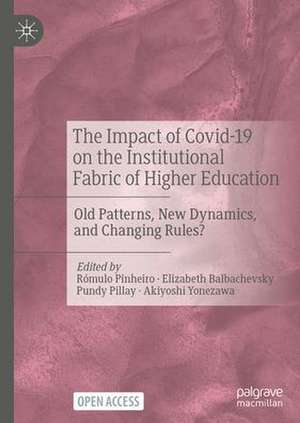The Impact of Covid-19 on the Institutional Fabric of Higher Education: Old Patterns, New Dynamics, and Changing Rules?
Editat de Rómulo Pinheiro, Elizabeth Balbachevsky, Pundy Pillay, Akiyoshi Yonezawaen Limba Engleză Paperback – 20 iul 2023
| Toate formatele și edițiile | Preț | Express |
|---|---|---|
| Paperback (1) | 283.87 lei 3-5 săpt. | +32.13 lei 7-13 zile |
| Springer International Publishing – 20 iul 2023 | 283.87 lei 3-5 săpt. | +32.13 lei 7-13 zile |
| Hardback (1) | 362.60 lei 3-5 săpt. | +36.53 lei 7-13 zile |
| Springer International Publishing – 20 iul 2023 | 362.60 lei 3-5 săpt. | +36.53 lei 7-13 zile |
Preț: 283.87 lei
Nou
Puncte Express: 426
Preț estimativ în valută:
54.32€ • 58.09$ • 45.29£
54.32€ • 58.09$ • 45.29£
Carte disponibilă
Livrare economică 27 martie-10 aprilie
Livrare express 13-19 martie pentru 42.12 lei
Preluare comenzi: 021 569.72.76
Specificații
ISBN-13: 9783031263958
ISBN-10: 3031263952
Pagini: 439
Ilustrații: XXIX, 439 p. 22 illus.
Dimensiuni: 148 x 210 x 34 mm
Greutate: 0.61 kg
Ediția:1st ed. 2023
Editura: Springer International Publishing
Colecția Palgrave Macmillan
Locul publicării:Cham, Switzerland
ISBN-10: 3031263952
Pagini: 439
Ilustrații: XXIX, 439 p. 22 illus.
Dimensiuni: 148 x 210 x 34 mm
Greutate: 0.61 kg
Ediția:1st ed. 2023
Editura: Springer International Publishing
Colecția Palgrave Macmillan
Locul publicării:Cham, Switzerland
Cuprins
Section 1: Setting the Stage.- Chapter 1: Assessing the impact of COVID-19 on the institutional fabric of Higher Education.- Section 2: The System's Responses to COVID-19.- Chapter 2: Evidence, stakeholders and decision making: managing COVID-19 in Irish Higher education.- Chapter 3: New actors, administrative measures and conflicting agendas: The impact of the pandemic on internationalisation of higher education in Poland and Russia.- Chapter 4: Highlighting systemic inequalities: The impact of the COVID-19 pandemic on French Higher Education.- Chapter 5: Higher education institutions responses to COVID-19 in Uganda: Regulatory tools and adaptive institutions.- Section 3: Higher Education Institutions' Responses to COVID-19.- Chapter 6: Higher Education in Brazil: Institutional actions for the retention of students in public and private sectors.- Chapter 7: Higher Education in Brazil: Institutional actions for the retention of students in public and private sectors.- Chapter 8: Internationalization of higher education in Argentina upon the arrival of Covid-19: Reactions and lessons from the perspective of International Relations Office.- Chapter 9: University-civic engagement in the time of the pandemic.- Chapter 10: Public Service Resilience in a post-COVID-19 world: The Case of Digital Transformation in Higher Education.- Chapter 11: Entrepreneurial universities: From research groups to spin-off companies in a time of COVID-19.- Section 4: Actors' Responses to COVID-19.- Chapter 12: Challenges, Opportunities, and Coping Strategies when Faced with the COVID-19 Pandemic: A Qualitative Study of Academics in Mainland China and Hong Kong.- Chapter 13: “We shouldn’t let academia exhaust ourselves anymore!”: Pandemic practices and the changing psychological contract in twenty-first century academia.- Chapter 14: Moving beyond policy on digital transformation: Perceptions of digital transformation of teaching by academic staff and students.- Chapter 15: Remote Universities? Impacts of COVID-19 as experienced by academic leaders in Finland between March 2020 and April 2021.- Chapter 16: Post-COVID-19: Renegotiating the scope, role, and function of support and development for students in higher education across the globe.- Section 5: Taking Stock and Moving Forward.- Chapter 17: Epilogue: COVID-19 and the institutional fabric of higher education.
Notă biografică
Rómulo Pinheiro is Professor of Public Policy and Administration at the University of Agder, Norway.
Elizabeth Balbachevsky is Associate Professor in the Department of Political Science at the University of São Paulo, Brazil.
Pundy Pillay is Professor of Economics and Public Finance at Wits University, South Africa.
Akiyoshi Yonezawa is Professor and Vice-Director at the International Strategy Office, Tohoku University, Japan.
Elizabeth Balbachevsky is Associate Professor in the Department of Political Science at the University of São Paulo, Brazil.
Pundy Pillay is Professor of Economics and Public Finance at Wits University, South Africa.
Akiyoshi Yonezawa is Professor and Vice-Director at the International Strategy Office, Tohoku University, Japan.
Textul de pe ultima copertă
This open access book assesses how the Covid-19 pandemic caught higher education systems throughout the world by surprise. It maps out the responses of higher education institutions to the challenges and strategic opportunities brought about by the pandemic, and examines the effects such responses may have. Bringing together scholars and case studies from Europe, Asia, Africa and the Americas, the book is both comparative and global in nature. It also brings together researchers from a variety of disciplinary fields, including political scientists, historians, economists, sociologist, and anthropologists. In doing so, the book fosters an inter-disciplinary dialogue and inclusive methodological approach for unpacking the complexities associated with modern higher education systems and institutions.
Rómulo Pinheiro is Professor of Public Policy and Administration at the University of Agder, Norway.
Elizabeth Balbachevsky is Associate Professor in the Department of Political Science at the University of São Paulo, Brazil.
Pundy Pillay is Professor of Economics and Public Finance at Wits University, South Africa.
Akiyoshi Yonezawa is Professor and Vice-Director at the International Strategy Office, Tohoku University, Japan.
Elizabeth Balbachevsky is Associate Professor in the Department of Political Science at the University of São Paulo, Brazil.
Pundy Pillay is Professor of Economics and Public Finance at Wits University, South Africa.
Akiyoshi Yonezawa is Professor and Vice-Director at the International Strategy Office, Tohoku University, Japan.
Caracteristici
Shows how the Covid-19 pandemic caught higher education institutions by surprise Maps out the responses of higher education institutions to the challenges brought about by the pandemic Brings together scholars from across the world This book is open access
